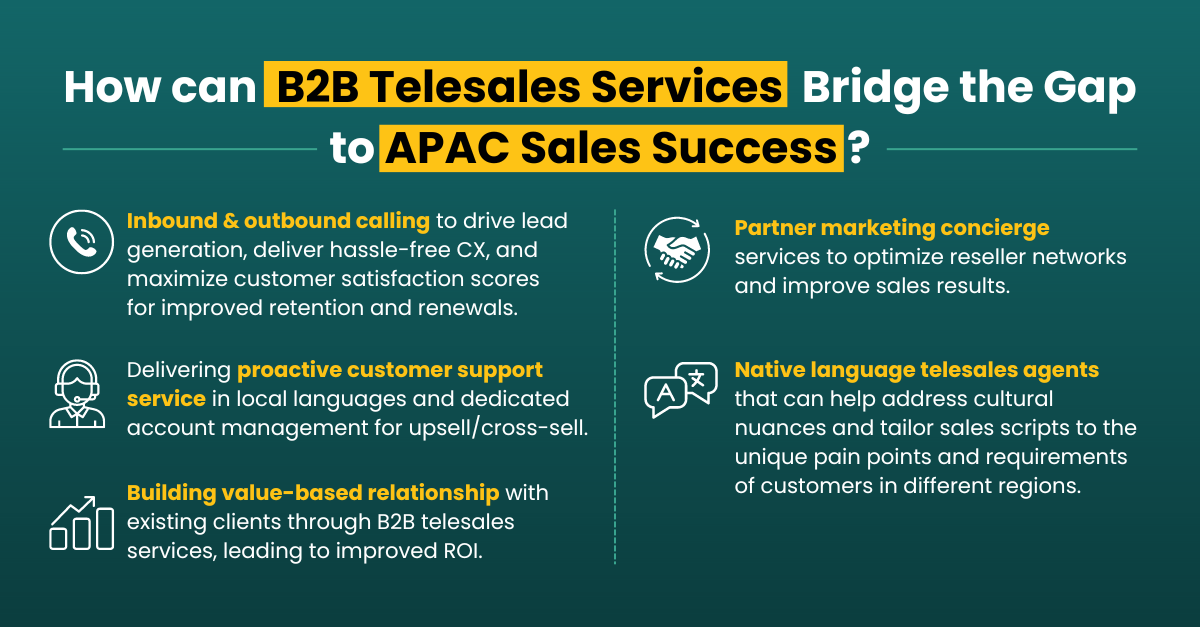The Asia Pacific market is rising as a hotbed of information technology innovation and different governments are accelerating digital transformation to not just support business expansion plans but also address citizen needs at scale.
There will be continued growth in the IT/ITES space as multiple new paradigms in technology vis-à-vis generative AI and machine learning are emerging. Singapore, Japan, Malaysia, India, and Australia are prime growth areas. Cloud adoption and cybersecurity are also witnessing an upward trend as digital acceleration. Major technology players are already amplifying investments in the region and reshaping the rules of the IT sales in the market.
Despite the massive potential, most IT players fail to succeed in the diverse Asia-Pacific market. There could be several reasons contributing to this trend, including lack of market understanding, poor localization efforts, cultural misunderstandings, inadequate marketing and sales efforts, and more. Furthermore, skyrocketing costs have cautioned both B2B and B2C buyers against spending indiscriminately, making it crucial for companies to understand and exceed expectations with their customer experience. In a stagnant marketplace cluttered with similar offerings, human touch and personalization is the biggest differentiator.
Challenges of APAC IT/ITES Sales Expansion & Go-to-Market Strategies
Treating the APAC region as a homogenous entity is a recipe for disaster. Each market within APAC holds distinct cultural nuances, communication preferences, and business practices. A uniform approach risks offending cultural sensitivities, failing to resonate with local needs, and ultimately, hindering market penetration.
Here's why diverse APAC markets require unique Go-to-Market strategies:
• Linguistic diversity: Languages like Mandarin, Hindi, Malay, and Thai each require native speakers to effectively connect and build trust.
• Cultural nuances: Different cultures have varying approaches to communication, decision-making, and relationship building. Understanding these nuances is key to fostering meaningful interactions.
• Local regulations and business practices: Legal and regulatory landscapes vary across APAC, demanding compliance and adaptation of sales approaches.
• Ineffective sales and marketing efforts: IT companies often fail to orchestrate effective and targeted sales and marketing efforts in the APAC. Lack of accurate account intelligence, poor partner relationships, siloed processes, and lack of personalization contribute directly to failed customer outreach outcomes.
B2B Telesales as a Bridge to APAC Success:
B2B telesales services, when tailored to the specificities of each APAC market, offer a powerful solution to these challenges. Here's how:
-
1
Leveraging Inbound and Outbound Strategies:
• Inbound calling: Multilingual B2B telesales teams can handle inbound inquiries from APAC prospects in their native languages, offering personalized support and building initial rapport.
• Outbound lead generation: Targeted outbound campaigns, adapted to local cultures and regulations, can generate BANT-qualified leads across different APAC markets. Outbound calling enables businesses to build and nurture customer relationships, while delivering seamless CX that addresses pain points and resolves their queries. -
2
Cultural Expertise and Language Fluency:
• Multilingual telesales: Engaging with prospects in their native language fosters trust and understanding, allowing for clear communication and nuanced dialogue. A robust B2B telesales strategy allows IT/ITES businesses to connect directly with decision-makers inlcuding, CIOs, CTOs, Admin Heads, IT Heads, CISOs, VP of Cybersecurity, VP of Information Security, Information Security Directors, Cybersecurity Executives, and more.
• Culturally sensitive scripts: Scripts customized to local cultural norms and communication styles ensure respectful and effective interactions. -
3
Customer Support and Relationship Building:
• Proactive customer service: Offering post-sales support in local languages builds trust and loyalty, fostering long-term customer relationships.
• Dedicated account management: Local B2B telesales teams can manage relationships with key accounts in each market, understanding their specific needs and preferences. -
4
Driving Reseller/Partner Marketing Amplification:
B2B telesales services can significantly bolster IT lead generation and amplify reseller/partner marketing efforts for improved sales results:
• Lead qualification and nurturing: Qualifying leads generated through partner campaigns and nurturing them through personalized interactions increases conversion rates.
• Partner onboarding and support: Providing telesales support to new partners helps them understand your offerings and engage effectively with prospects.
• Joint channel sales activities: Collaborative outbound campaigns, combining your reach with your partner's network, maximize lead generation and conversion potential. -
5
Supporting Cross-Sell/Upsell Revenue:
B2B telesales teams can play a significant role in driving cross-sell/upsell revenue:
• Identifying upsell opportunities: Ongoing interaction with existing customers allows for identifying IT sales opportunities to suggest relevant additional services or upgrades.
• Value-based proposals: Telesales agents can tailor proposals highlighting the specific benefits of upselling or cross-selling based on individual customer needs.
• Relationship-based selling: Trust built through consistent engagement creates a fertile ground for discussing additional solutions with existing customers.
Conclusion
The diverse and dynamic APAC IT/ITES market presents both challenges and opportunities. By understanding the cultural nuances of each market and implementing B2B telesales strategies tailored to local contexts, IT/ITES companies can successfully navigate this vast region, and unlock its full potential for revenue growth. From B2B lead generation to booking qualified appointments with IT decision-makers, and driving incremental revenue, B2B telesales services holds the key to success in the APAC markets. Remember, cultural sensitivity, language fluency, and personalized engagement are key to building trust and long-term partnerships in the APAC marketplace. Partner with B2B telesales service providers who specialize in catering to the unique needs of each market, and watch your expansion goals in the APAC region soar.
Read Responses
No Comments
Leave a Reply
Your email address will not be published.


